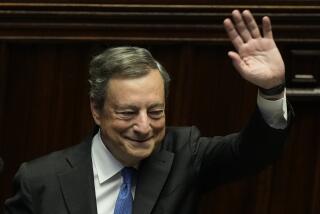Bulgaria Ends Communists’ One-Party Rule
SOFIA, Bulgaria — In a move that virtually ends communism’s ascendancy in the former Soviet satellites of Eastern Europe, Bulgaria’s Parliament on Monday voted overwhelmingly to abolish the leading role of the Communist Party.
After less than an hour’s debate, all but a handful of Parliament’s 400 deputies voted in favor of a constitutional amendment that effectively ends the one-party state.
The vote came two months after the former dictator, Todor Zhivkov, was deposed. It leaves tiny, isolated Albania as the lone Communist state remaining among the nations that once served as Moscow’s western empire.
Albania’s leadership broke with Moscow in the early 1960s.
Only hours after ending one-party rule, the Parliament approved the interim results of a special commission looking into past abuses of power. It said that “Zhivkov, his family and his circle” were under investigation on charges of corruption, embezzlement and other offenses.
Politburo member Andrei Lukanov, who is chairing the commission, said that Swiss authorities are helping to investigate Zhivkov’s foreign bank accounts but indicated that the former leader also likely will be held responsible for political crimes.
“The commission will report (on Zhivkov) in the near future,” Lukanov said.
Parliament also voted to set up a committee to study other constitutional changes needed to facilitate the country’s move toward political pluralism and democracy.
“This is only the beginning,” predicted Petre Dertliev, a 73-year-old leader of the recently revived Social Democratic Party and a man jailed for 10 years after the Communists came to power in the 1940s.
“It’s a historic day,” added Petar Beron, a leader in another prominent opposition group, Ekoglasnost. “It’s an important day because the legal text giving power to the party has been dropped, (but) we can’t allow ourselves to rest on this achievement.”
A coalition of 12 recently emerged opposition groups known collectively as the Union of Democratic Forces is scheduled to meet today for the first substantive round-table negotiations with Bulgaria’s new Communist leadership.
The main aim of the talks is to agree on a path toward free elections and full democracy later this year.
At a large opposition rally in central Sofia on Sunday, speakers called for a free press, material support for opposition political groups and the dismantling of the Communist Party’s apparatus that still extends deep into the army, the police and the factory-shop floor.
In an interview after Monday’s parliamentary session, Beron threatened to boycott the talks unless the Communists assigned premises for an opposition headquarters and fixed a date when its newspaper could begin printing.
“We’ll strongly demand these tomorrow,” he said.
While a more reform-minded Communist leadership has agreed to political pluralism, it remains in control of the press and has provided little government assistance to the fledgling opposition.
Dertliev, for example, complained that his party was forced to work from the one-room apartment of its general secretary.
While the Communist Party historically has deeper roots in Bulgaria than in other East European countries, few observers believe it can survive free elections in a majority position.
The Communist tactic seems to be to press for elections as quickly as possible before the opposition is able to capitalize on the country’s new political freedom.
Party leader Petar Mladenov has called elections for May, while the opposition would like to delay them until November.
In addition to cutting the opposition’s organization time, early elections likely would reduce the potential damage to the Communists of investigations currently under way into excesses committed during the Stalinist era.
In a step hailed by the opposition, Interior Minister Atanas Semergiev told Parliament that all elements of his ministry, including the police, would be separated from party influence.
“The minister and the actions of the ministry itself would be responsible directly to Parliament,” he said.
Depoliticizing interior ministries, which includes secret police units, has been one of the most delicate aspects of political transformation in Eastern Europe because the action constitutes the de facto disarming of the party’s chief element of control.
Much of Monday’s debate reflected a country gradually confronting its past, yet uncertain of its future.
As the Communist-dominated Parliament voted to rehabilitate some of Zhivkov’s opponents, many of those opponents watched from the galleries.
Zhivkov also was blamed for the persecution of opposition figures from the late 1940s, before he came to power, in what appeared to be an attempt to preserve the image of Bulgaria’s first Communist leader, Georgi Dimitrov, a man hailed as the father of the nation since the Communists took power in 1944.
Zhivkov, for example, was deemed responsible for the 1947 hanging of former Agrarian Party leader Nikola Petkov, an event that occurred seven years before Zhivkov took control.
“Todor Zhivkov is now the culprit for everything,” Beron said.
The commission investigating the country’s political past also formally rehabilitated several former political leaders, including Petkov and nine people accused of plotting a 1964 coup attempt against Zhivkov.
More to Read
Sign up for Essential California
The most important California stories and recommendations in your inbox every morning.
You may occasionally receive promotional content from the Los Angeles Times.








